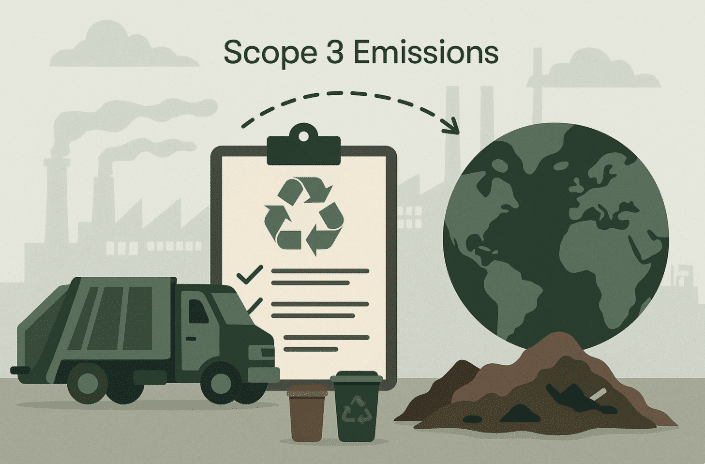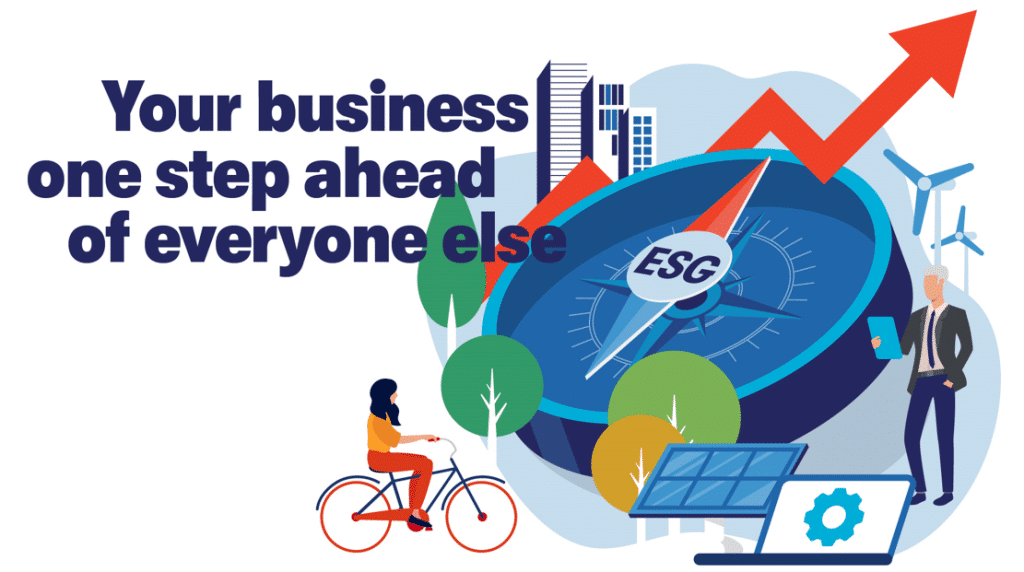Waste & material traceability solution for sustainable facilities

As ESG reporting requirements become more stringent and stakeholder expectations for environmental transparency continue to rise, companies face increasing pressure to measure and report their complete carbon footprint. While Scope 1 and Scope 2 emissions have traditionally received the most attention, Scope 3 emissions — which often represent 70–90% of a company’s total carbon footprint—are now under intense scrutiny from investors, regulators, and customers.
For sustainability professionals, understanding and tracking Scope 3 emissions, particularly those related to waste management, has become a strategic imperative that directly impacts ESG performance and corporate reputation.
Scope 3 emissions encompass all indirect emissions that occur in a company’s value chain, including upstream and downstream activities. In waste management, these emissions are particularly significant because they include the treatment and disposal of waste generated by operations, the transportation of waste materials, and the end-of-life processing of products.
The challenge lies in their complexity and the fact that they occur outside direct operational control. Unlike Scope 1 or 2, Scope 3 requires tracking across the entire chain. Waste emissions vary based on composition, treatment method, and transport distances, making accurate measurement difficult but crucial.
For many organizations, waste-related Scope 3 emissions represent a substantial portion of their footprint. Processes like landfilling, incineration, and transport generate high emissions—but also present opportunities for reduction through better practices, recycling, and circular economy initiatives.
The strategic importance of accurate measurement extends beyond compliance. Companies able to demonstrate reductions gain competitive advantages through improved ESG ratings, stronger stakeholder confidence, and access to sustainable financing.
Effective ESG reporting requires granular data on waste generation, composition, and disposal methods. Waste traceability—the ability to track materials from generation through final processing—provides the foundation for accurate Scope 3 emissions calculations.
Traditional waste management often lacks this capability. Many organizations struggle with data gaps, inconsistent reporting, and limited visibility into downstream processing. These challenges make it difficult to calculate Scope 3 emissions credibly and demonstrate progress.
Comprehensive waste traceability addresses these issues by providing detailed data on flows, treatment methods, and impacts. This visibility enables organizations to identify hotspots, optimize waste practices, and show measurable progress.
The regulatory landscape is reinforcing this need. The Corporate Sustainability Reporting Directive (CSRD) and Task Force on Climate-related Financial Disclosures (TCFD) now require detailed disclosure of waste-related emissions. Without robust traceability, companies risk compliance failures and reputational damage.
Beyond compliance, traceability supports better decision-making—revealing opportunities for cost savings, operational efficiency, and sustainability improvements.
The evolution of ESG standards has created pressure on organizations to move beyond high-level sustainability statements. Investors and stakeholders now expect detailed, verifiable data on environmental performance, especially Scope 3 emissions.
Today’s ESG reports require:
With ESG reports increasingly subject to third-party verification, data accuracy and auditability are critical. Organizations that can prove measurable Scope 3 improvements gain access to sustainable financing, improve valuations, and strengthen their brand reputation.
Without robust traceability systems, many organizations:
The outcome is clear: poor data weakens ESG credibility, while strong, verified reporting improves financial and reputational standing.
Evreka’s WasteDashboard addresses the critical need for accurate waste traceability and Scope 3 tracking. It consolidates complex waste data into actionable insights that support robust ESG reporting.
Key benefits include:
With WasteDashboard, sustainability teams move beyond manual reporting to real-time, audit-proof Scope 3 management.
While ESG compliance is a driver, comprehensive waste traceability also delivers operational gains. Companies using platforms like WasteDashboard report improvements in efficiency, cost management, and strategic decision-making.
By pinpointing waste generation hotspots, organizations can target reductions that lower both Scope 3 emissions and costs. Real-time monitoring uncovers trends early, enabling proactive management. Audit-ready reporting reduces administrative burden, saving time and resources while improving credibility.
As ESG reporting requirements continue to evolve, organizations need systems that can adapt to new standards and stakeholder expectations. WasteDashboard’s flexible architecture and comprehensive data collection capabilities position organizations to meet future reporting requirements without major system overhauls.
The platform’s detailed data collection supports emerging requirements for supply chain transparency and circular economy reporting. As regulations expand to require more detailed waste and emissions tracking, organizations with comprehensive traceability systems will be better positioned to comply with new requirements.

WasteDashboard provides the foundation for accurate Scope 3 emissions tracking and comprehensive waste traceability that supports robust ESG reporting. By consolidating complex waste data into clear, actionable insights, the platform enables organizations to move beyond basic compliance and demonstrate true sustainability leadership.
Organizations that master waste-related Scope 3 tracking will:
Don’t let data gaps or limited visibility undermine your ESG credibility. With WasteDashboard, you can transform waste data into a strategic asset that supports both environmental goals and business performance.
To get a complete overview of EU sustainability regulations for brand owners and waste producers, download our detailed guide: “Sustainability Compliance Handbook for Brand Owners in the EU.” Covering packaging, textiles, automotive, electronics, healthcare, and logistics, this handbook explains exactly what’s required — and shows how real dashboards can simplify compliance, reporting, and traceability.
Request a demo for more detailed insights into how Evreka’s solutions can transform your waste data into powerful ESG insights that drive both compliance and competitive advantage.